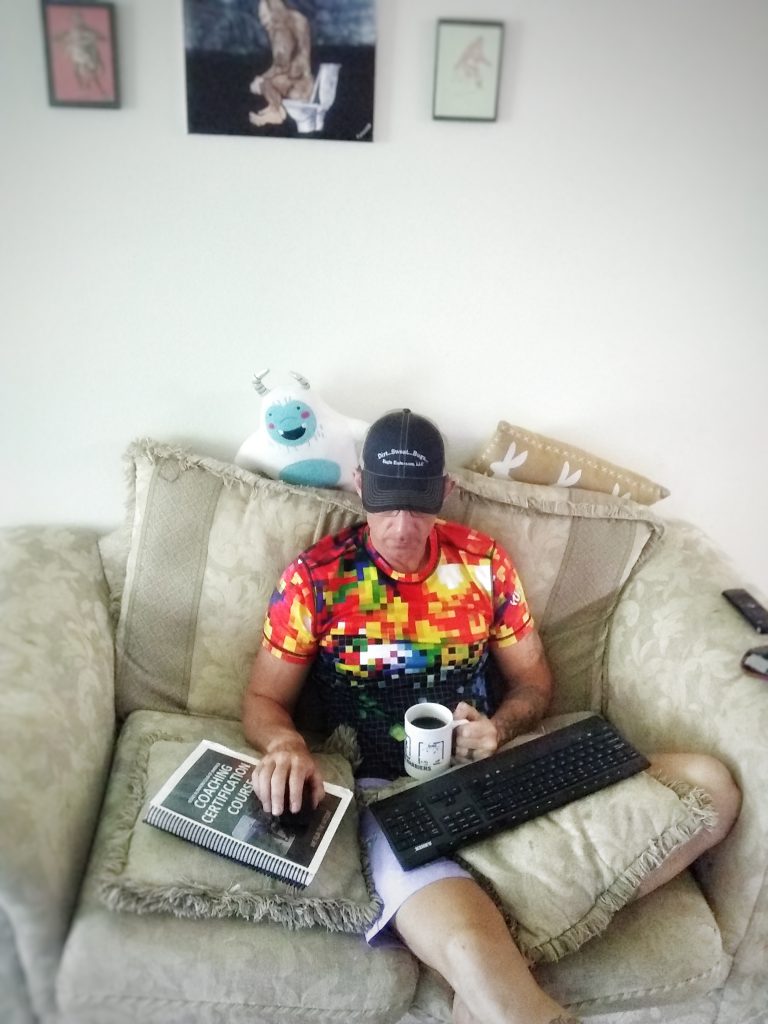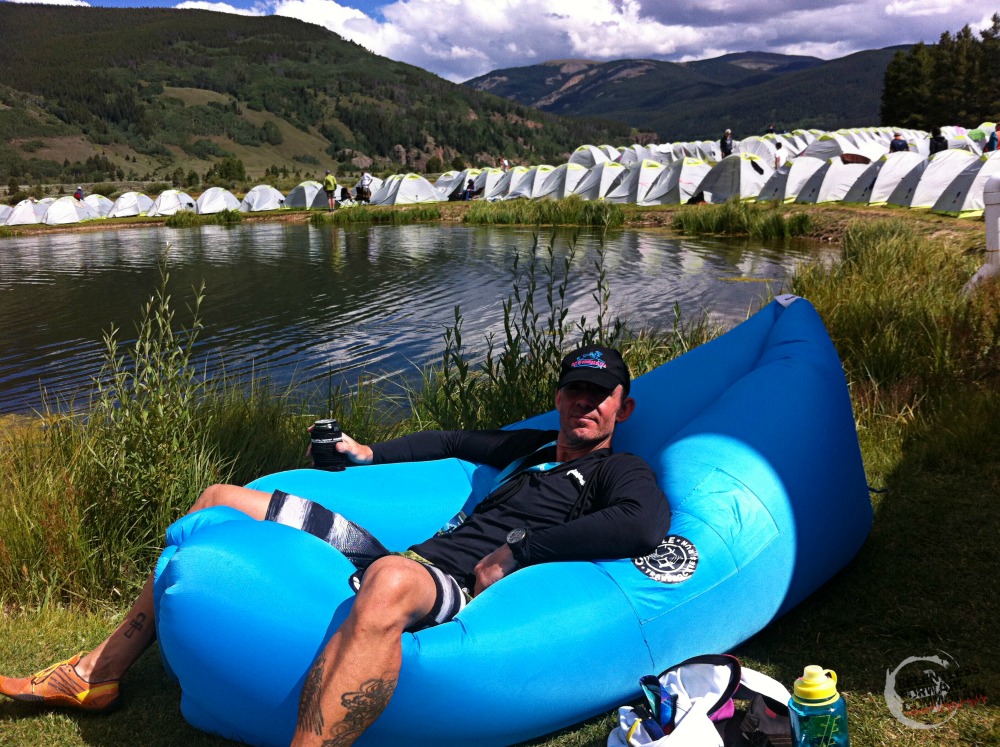Last Updated on April 29, 2018 by Heather Hart, ACSM EP, CSCS
Just over six months ago my husband and I decided to take the leap into run coaching. The initial plan was to make run coaching a part time gig, to share our knowledge and experience on a professional level with our friends and family. But the universe had different ideas. Not 48 hours after creating our coaching Facebook page, we found ourselves unexpectedly parting ways from our full time employer. Now jobless, broke, and with nothing to lose, we dove into our coaching business head first.
It was terrifying.
Six months later we are far from experts when it comes to the business of coaching, but we’ve certainly learned a thing or two…or two hundred. Our coaching business is thriving, and we have a few dozen incredible clients tackling everything from their first Spartan Sprint 5K to their first ultramarathon, working on being able to run one single mile without stopping, to tackling a 200 mile race (yes, you read that right. TWO. HUNDRED.MILES.)
That said, everyday is still a learning process.
As long time fitness professionals ourselves, the actual programming as well as working knowledge of exercise physiology, biomechanics, injuries, and other things that pop up with clients has never been a problem for us. This is what we do, this is all within our working “wheelhouse” if you will. But there were a number of aspects of run coaching that definitely took me by surprise. So of course I wrote a blog post about them.

It’s a lot more time consuming than you might expect.
Initially I thought: “athletes can only train once a day, how long can it really take to plan their workouts?” The answer: a lot longer than you might think. Geoff and I spend at least 20-30 hours a week writing and re-writing training plans, as well as staying in touch with clients. Our clients are not elite athletes, and therefore, they often have real-world situations that frequently disrupt training. There are unexpected childcare issues, illnesses, work delays, funerals, weddings, you name it, that might throw off a training schedule, even in the most determined athlete.
This winter alone nearly 1/4 of our clients battled the relentless below zero temperatures and ice of the NorthEast, and therefore simply could not run safely outside. So we had to change their workouts last minute to accommodate finicky mother nature, who clearly didn’t care at all about their training schedules.

Why yes, my business and marriage partner has figured out how to work from the couch, using the TV screen as his monitor. Also: yes we do have a portrait of a Bigfoot on a toilet in our living room. Welcome to my crazy life.
Further, each client has their own specific goals, strengths, and weaknesses. While the methodology remains the same, there is absolutely zero copying-and-pasting of workouts between clients.
So while the idea of coaching full time may fill you with visions of focusing on your OWN training all day, and occasionally updating a training peaks profile at night, the reality is, you might spend far more time glued to your desk chair and computer screen than you initially anticipated.
Don’t forget the “business” part.
Marketing, social media, billing, insurance, intake forms, coaching platforms…the list goes on and on. There is a lot more involved than simply helping people reach their goals. If you truly want to make coaching your full time job, you’ve got to build the groundwork to a sustainable business. I won’t lie, this has been the hardest part for me in this adventure.

Frolicking through the wildflowers = easy. Creating financial spreadsheets = not so easy.
Part coach, part therapist.
Have you ever heard the saying “running is cheaper than therapy”? It’s true. For many, running can be a stress reliever, a coping mechanism, an anxiety blocker…you name it. Combine this with the stress of training for a goal race, and emotions often run high among clients.
As a running coach, you spend a lot of time guiding clients along the emotional roller coaster that is endurance training. Reminding them that bad runs happen from time to time. Assuring them that they are capable of reaching their goals. Keeping them grounded with realistic expectations when they set their sights perhaps a tad too high based on current progression and abilities. Figuring out ways to help your clients navigate combining real world responsibilities (family, work, relationships) with training.
As a coach, you’ll spend a lot of time listening. It’s important to practice empathy, but also know where your scope of practice ends, and when a referral to a true therapist or psychiatric professional needs to happen (because sometimes it does).

Take a seat on my running coach therapy couch. Tell me what’s been going on.
Establishing boundaries matters.
Some coaches limit communication with clients to weekly emails, or once a month phone calls. Some charge more for daily interaction. This is certainly a personal decision. Geoff and I decided from the beginning that we wanted to be accessible to our clients as often as they needed us. For some, they briefly check in once a week, with very little feedback. They are happy to chug along with their training programs as prescribed. Others need near daily interaction, and that’s OK too.
In the very beginning, we encountered clients who would email late at night, and expect a response before they woke up in the morning. It was frustrating for all parties involved, so we realized quickly that it was important to establish boundaries for our coaching business and communication expectations. Afterall, we also have a family, our own training, and other responsibilities that we needed to tend to (and you know, sleep.)

My little runners
Learning to say “NO”.
After hearing endless stories of negative coaching experiences with very controlling coaches, I wanted to be the complete opposite of that. I wanted to be the free spirited coach who allowed their clients to make their own happy running decisions.
It quickly bit me in the ass.
Often times, the reason a client hires a coach is because they don’t understand the concepts of endurance training. They don’t understand why they can’t race a 5K every weekend in lieu of a long run and expect to be successful at a 50K race. It’s your job as a coach to guide them through the training process, and in order for that process to be successful, sometimes you have to say no. No, a hilly, hard half marathon the weekend before your goal marathon when you should be tapering is not a good idea. No, moving your training runs around and doing them whenever you want is not ideal, that’s not how programming works. No, running your recovery runs at race pace is not OK, even if you “feel good”.
Saying “NO” is not always easy, especially when it’s not what your clients want to hear. But it is your job to be the voice of reason. Afterall, if the client wanted to make all of the decisions on their own, they wouldn’t have hired you in the first place.

Never say “NO” to trails.
You won’t be everyone’s cup of tea.
When a potential new client inquires about our coaching services, we try our best to explain our methods, philosophies, and personalities. In turn we try to get a feel for the clients goals and expectations to see if we’d be a good fit. Despite the interview process, sometimes clients discover a few weeks or months into coaching that perhaps our coaching style isn’t what they were expecting or hoping for. Sure, adjustments can be made and often are, but occasionally you will have a client that says “this isn’t really working for me” and will no longer use your coaching services.
It happens.
It’s hard to not take that coach/client breakup personally, but it’s important to remember that we are all so incredibly unique and different. As such, you won’t be everyone’s cup of tea. Maybe you’re too nice and your client was looking for a hard ass, drill sergeant style coach. Perhaps you are strict with your expectations from clients, and that person was looking for a coach with a much more lenient coaching style. The good news is that for everyone you aren’t a good fit for, there will be another client that truly appreciates your coaching philosophy and style.

We are…unique (or feel free to insert your own descriptor here). Some people love our enthusiasm and unconventional coaching approach…others don’t. And that’s OK!
I get FOMO all of the time.
It’s one thing to see a friend announce they registered for a race, and to suddenly feel that pang of “aww, I want to do that” jealousy (aka “fear of missing out”, or FOMO). But the FOMO I experience with clients goes to another level. As coaches, we spend time researching our clients races, down to the very last details, to make sure they are fully prepared for all aspects of the event. Further, it is our job to think about and talk about that event almost every day, for months at a time. So when a client is training for a “bucket list” race, or simply training with views like this:

Thanks Annette, for the awesome photo!
…it’s hard not to get a little jealous!
You will become emotionally invested in your clients success.
I’m pretty sure this was something they told us not to do at our RRCA coaching certification course, but I can’t help it. We put a lot of time and effort into our clients success, it’s near impossible to not become emotionally invested in their success. We get excited everytime we receive a text or email about a great training run. We celebrate when a client successfully finishes a race. And we scream “F*CK” at the computer when a client emails to let us know that they unexpectedly suffered a (non running related) injury that’s going to set them back.
As much as I absolutely love running, I’ve found myself getting more excited about clients successes than my own. I thrive on their good runs, their PR’s, their enthusiasm. It’s certainly a part of being a running coach that I never expected…and I absolutely love every second of it.
_____________________________________________
I’d be remiss if I didn’t take this time here to thank all of our clients for trusting us with their training, especially those who jumped on board right from the beginning. You guys absolutely make the highs and lows of this job (let’s be honest, it’s 95% highs) absolutely worth it. Here’s to countless more miles, races, and new friendships!
Heather Hart is an ACSM certified Exercise Physiologist, NSCA Certified Strength and Conditioning Specialist (CSCS), UESCA certified Ultrarunning Coach, RRCA certified Running Coach, co-founder of Hart Strength and Endurance Coaching, and creator of this site, Relentless Forward Commotion. She is a mom of two teen boys, and has been running and racing distances of 5K to 100+ miles for over a decade. Heather has been writing and encouraging others to find a love for fitness and movement since 2009.

Wendy
One of the comments I hear from my friends who are running coaches is about their clients who don’t follow the plan and do their own thing. That has to be so frustrating and I can imagine how difficult it is to confront a client who’s gone rogue! I like what you said about boundaries–I think it’s important to establish that upfront. I find that to be an issue even in my job as a nurse practitioner–people expect you to be available 24/7! Great post.
alisamarie
I think it sounds amazing to have a job that involves a good chunk of activity, but there is always that business side!
joyfoodsunshine
Congrats on your new endeavor! Maintaining boundaries is so important no matter what your job is! Family comes first always!
loveandzestkristina
This job is perfect! Get to do what you love plus you get your workouts in while you work! Win win!
Emily Kyle
Don’t laugh – but I didn’t even know there was such a thing as a running coach. What an amazing opportunity!
Miss Whisk, A Whisk and Two Wands
I think it would be hard to be a running coach and can see how you would be emotionally invested in them. I have to giggle at not everyones cup of tea. I think people often think it’s easy to motivate someone to run, eat healthy, ect but everyone is different as is what motivates them.
Lorie
Several of my closest friends are run coaches so I can definitely see the truth in this list!
Sonali- The Foodie Physicians
Congratulations on what sounds like an amazing opportunity! If I needed a running coach, I would want it to be you! 🙂